When the National Hockey League board of governors approved six new franchises to start play in the 1967-68, the reaction across North America was swift, passionate and often unfavourable. In fact, except the centres that were awarded teams, the process by which the league expanded was generally panned.
Reactions in the cities selected was, of course generally positive – at least for those who actually knew that their community was bringing the NHL to town. In most of the cities, the awarding of the franchises was a non-event except to those directly involved in the applications and the small enclaves of fans in most centres.
Even in New York cities, the daily papers devoted no space to the NHL expansion news.
In the cities that were rejected, there was bitter resentment or quiet resignation that maybe, they never really had a chance. Even the Canadian parliament got into the act, expressing their displeasure with the exclusion of Vancouver.
San Francisco to be the Seals
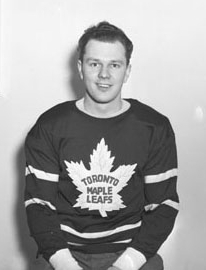
The San Francisco entry will be known as the California Seals. The team will operate out of the Oakland-Alemeda County Coliseum, as the league stipulated as one of the conditions of the franchise.
George Fleherty, president of the Shasta Corporation and listed as the principal owner of the team, announced the club’s name this week. He also said that the Western Hockey League Seals will adopt the “California Seals” moniker for next season and will play out of the Oakland arena in 1966-67. The Seals presently use the San Francisco Cow Palace as their home rink.
It was originally thought that any San Francisco NHL bid would play out of the Cow Palace, However the NHL rejected the notion that the Cow Palace met NHL standards. The budget submitted to the California legislature this week by Governor Edmund Brown included $1.6 Million slated for improvements to the Cow Palace. That money was conditional on the Seals signing a 10-year lease. Those improvements now will go by the way side.
Cow Palace manager Ed Diran wasn’t particularly upset with the Seals’ decision:
“I cannot say I am surprised. We can’t force them to come here. All I can say is that the Cow Palace can get along better without hockey than hockey can get along without the Cow Palace.”
Norman (Bud) Poile, a former Toronto Maple Leafs player, is the general manager of the Seals WHL team. It’s thought he will be retained by the ownership group to run the NHL club as well.
Pittsburgh Group Anxious to Get Going
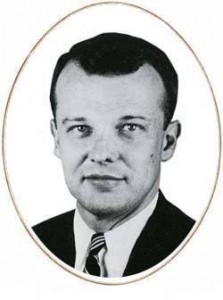
The successful Pittsburgh group is headed by Senator Jack McGregor and attorney Peter H. Block. They are anxious to hit the ground running and want an organization in place immediately.
Block said that they will begin to build a solid hockey organization from the ground up. The first step will be to elect a board of directors from among the investors. Block said that the next step will be to find a general manager.
“We’ll be looking for the best in the business. After that, he’ll have the task of establishing a scouting system and a farm system.”
As far as player acquisition, Block said that would be solely the GM’s job, but that no players will be acquired until the summer of 1967. He said that no mechanism for player distribution had yet been decided.
Block also said that he wants the team to establish a minor-league farm team and have it operating by next season. So minor-league staff will be hired almost immediately. They want their NHL coach to be in place by the spring of 1967.
Block did not rule out the present staff of the AHL Hornets being retained. Aldredge (Baz) Bastien is the general manager, with Eddie Bush serving as coach.
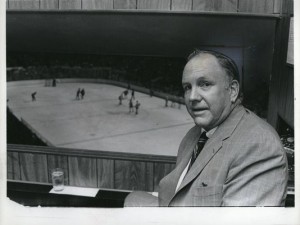
One of the investors in the team is Art Rooney, who owns the Pittsburgh Steelers of the National Football League. Rooney says he is a minor investor, but he will be as active as necessary in aiding in the development of a winning team.
Senator McGregor asked Rooney to join the syndicate because of his widespread relationships with numerous sports teams.
The new Pittsburgh team will have to compensate Bruce Norris, owner of the Detroit Red Wings and the Pittsburgh Hornets of the American Hockey League. Block anticipated no problem dealing with Norris:
“Mr. Norris has been very cooperative with us in obtaining this franchise and has assured us he will be very reasonable with us when it comes time for us to purchase his (the Hornets) territorial rights.”
The Pittsburgh Hornets will remain in Pittsburgh for the 1966-67 season. They will be moved to another city by the parent Red Wings for 1967-68.
The new NHL team will play in the Pittsburgh Civic Auditorium. The arena authority has approved the necessary funds to bring the building up to NHL standards. Seating capacity will be increased to 12,800, 300 above league requirements.
The team presently has no name. It is likely that will be decided by a “name the team” contest for Pittsburgh fans.
Philly Mayor Pledges Hockey Help
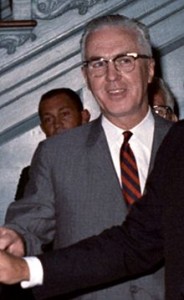
Mayor James J. H. Tate of Philadelphia is high on the new NHL team that was awarded to the city by the league governors this week, He says that the city and the community will provide the financial support needed to ensure the club will be one of the best in the loop.
Philadelphia Eagles treasurer Ed Snider says that an arena will be built in the same area as a proposed new sports stadium. Snider works for Eagles owner Jerry Wolman, who has a large stake in the hockey club as well.
Snider says that the new Philadelphia rink would be a state of the art facility, costing $6 to $10 million. It will seat 16,000.
Jerry Shiff, another part owner of the team, says the new rink will be ready to go for October, 1967.
Snider says that neither he nor Wolman will take part actively in the management of the hockey club. That will be left to William Putnam. Putnam is the former vice-president of the Morgan Guaranty Trust Company of New York.
The last professional hockey team in Philadelphia was the Philadelphia Ramblers of the Eastern Hockey League. That team folded after the 1963-64 season. It was later reorganized as the Jersey Devils of the EHL. That team now plays in Cherry Hill, New Jersey.
Whither St. Louis?
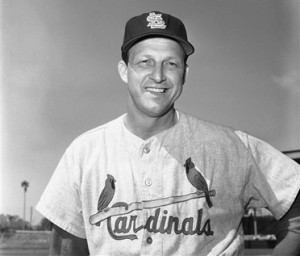
The St. Louis situation is a real head-scratcher. With no delegation at this week’s meetings, most observers felt that the Midwest city was all but finished as a candidate for an NHL team. Yet surprisingly, the city was awarded a conditional franchise by the NHL governors. And that despite strong bids by Buffalo, Baltimore and Vancouver.
It comes down to this. Like it or not, this league still lives up to its long-time nickname – the “Norris House League.” Big Jim Norris, part-owner of the Chicago Black Hawks, still rules the roost as far as the NHL board of governors is concerned. If Big Jim wants you in the NHL, then by gosh, you are going to be there. And if he doesn’t, there isn’t much you can do about it.
Norris and his partner Arthur Wirtz own the St. Louis Arena. It’s an old barn, but seats 14,000 and it does have some character. But to house an NHL team, it needs a lot of sprucing up and updating. Norris wants no part of expense of the required renovations and is eager to dump the building.
So, knowing that the league needed unanimous approval of a decision to expand, Norris simply told his fellow governors that St. Louis will get a team, and its new owner will purchase his rink. If that wasn’t guaranteed, then he was not going to vote for any form of expansion.
Norris’ opposition to adding to the NHL membership is well-known. The other governors knew that and agreed to Big Jim’s demands. And today, St. Louis has an NHL team. Where the owner for the club comes from is anybody’s guess.
Norris says he has at least four buyers lined up for the arena, and at least one of those buyers wants the NHL team. Norris is close with former St. Louis Cardinals great Stan Musial. The story out of St. Louis yesterday was that Musial is putting together a group of 16 investors and will submit a bid to the league some time within the next week. One of Musial’s investors will be Biggie Garagnani, who is partnered with Musial in a successful St. Louis restaurant.
NHL president Clarence Campbell is confident owners for the franchise will be found by the April 5 cut-off date. However, if no ownership group comes forward, then Baltimore will be the next city in line for the franchise.
Eight-Man Group for Twin Cities
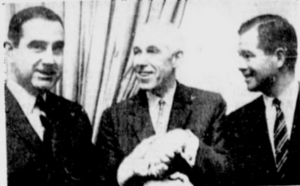
The franchise in Minneapolis-St. Paul will be operated by an eight-man group headed by lawyer Walter Bush and Gordon Ritz and Bob Ridder, local television station owners. Bush has been very active in minor hockey in the state of Minnesota. Ridder has been the manager of several United States Olympic hockey teams.
The state of Minnesota has a rich hockey heritage. It’s also a hockey hotbed, but mostly at the minor and high-school level. It remains to be seen if the passion for the youth game can translate to the professional level.
The Twin Cities triumvirate says that it will build a new arena that will exceed NHL standards. It will seat at least 14,000 and will be ready for the 1967-68 season. No decisions on a management team or a name for the new club has been made.
Small Rink Stalled Cleveland Bid
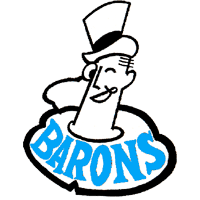
Paul Bright, president of the Cleveland Barons of the American Hockey League, says that the lack of a big-league arena was the main reason he didn’t press for a National Hockey League expansion franchise.
Bright had been expected to make a presentation to the NHL governors but he pulled back when he learned the league wanted an arena with a minimum seating capacity of 12,500. The arena in Cleveland seats about 10,000.
Bright says the arena is owned by a private group in Cleveland and the hockey club has no control over the building. He said that if the Barons owned the rink, they would have been able to provide options for upgrades. The present ownership of the rink has no interest in spending that kind of money.
Bright wasn’t completely giving up, however:
“I still think it’s all up in the air. It’s not final yet. Those franchises are conditional. Two of the six may get in. Los Angeles for sure. And maybe San Francisco.
“But I doubt if Minneapolis-St. Paul and St, Louis will make it. Baltimore has a better chance than Pittsburgh. And Philadelphia doesn’t have an arena or the plans for one.”
Waiting Game for Baltimore
It’s now a waiting game for the owners of the Baltimore Clippers. The American Hockey League team’s ownership group made a strong bid for an NHL franchise, but were rejected. They were, however, listed as the next group in line should the conditional St. Louis franchise fail to materialize.
Louis Grasmick is the chairman of the Baltimore group. He bitterly lashed out at the NHL for their decision. Grasmick said that in every conversation he had with NHL president Clarence Campbell Baltimore met or exceeded the requirements of the league. He felt he had been mislead by the league.
More Expansion Reaction
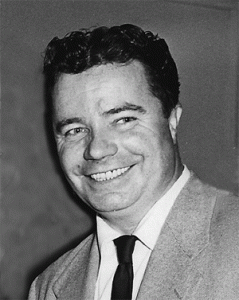
Journalists across Canada weighed in on the NHL expansion announcement. Some of the best reactions are here:
Hal Walker, Calgary Herald: “The decision by the National Hockey League to embrace six United States cities has a happy omen for scores of hockey players now down in the minor leagues or on the junior farm. This means a lot of the skaters who had little or no chance of making the current six-team NHL will be absorbed by the new teams and their salaries will be at the major league level.”
Jim Kearney, Vancouver Sun: “… It’s as much the Norris House League as it ever was. Expansion has proven that. It is quite obvious now that the NHL owners started to discount Vancouver on the day the Frank McMahon – Max Bell group dropped out of competition to buy the Canucks. McMahon and Bell are the guys they wanted. They have made that patently obvious.’
Paul-Emile Theriault, Moncton Evangeline: “Giving the United States a 10-2 edge in representation in the NHL was a tour de force by league president Clarence Campbell for which he deserves the Lester Patrick Trophy warded each year to the person who does most for hockey in the United States.”
Bob Brisco, Moose Jaw Times-Herald: “Unfortunately for the people of British Columbia, Vancouver and even Western Canada, the National Hockey League is business, and big business. It appears as though the main reason for the exclusion of Vancouver from the expansion plan is lack of a lucrative television territory.”
Bill Westwick, Ottawa Journal: “There won’t be any letters from Quebec on this hockey situation. Any provincial letters of protest now may be forthcoming from British Columbia where Vancouver folks feel they’ve been handed the queen of spades.
“It still will be the National Hockey League but a rather far cry from what impelled the Canadian organizers of the world’s leading hockey circuit to give it this name back in 1917.”
Canadian Parliament Not Happy
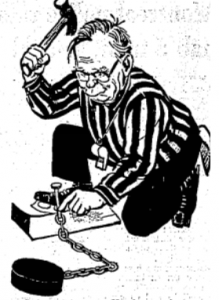
Members of the Canadian Parliament have suggested a probe into the dealings of the National Hockey League in relation to their announcement of the league’s expansion from six to 12 teams. Prime Minister Lester Pearson may informally contact NHL president Clarence Campbell and the board of governors to make it abundantly clear that the federal government and Parliament regret the exclusion of Vancouver by the league.
The possibility of a review of the NHL’s decision may be explored.
Sources close to Prime Minister Pearson said that the government is reluctant to get involved in the affairs of a professional sports league. It’s not clear whether Parliament has jurisdiction over the activities of a professional sports organization.
What is clear is that the government is under heavy pressure from the opposition parties to take a strong stand on the Vancouver snub.
One member of parliament went even further. R. W. Prittie, the NDP member from Burnaby – Port Coquitlam, suggested that the NHL be scrutinized for possible infractions of the Combines Investigation Act. This would be an action similar to the anti-trust investigation of Major League Baseball in the United States.